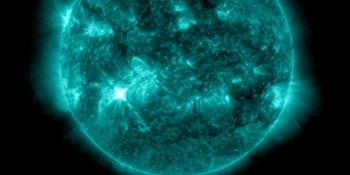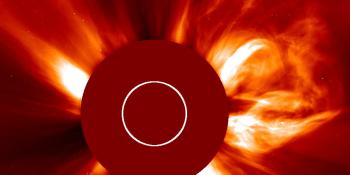Visualizzazione archivio di sabato, 20 aprile AM
Rapporto attività solare
Ogni brillamento solare menzionato nel rapporto ha un fattore di scala, applicato dal Centro di Predizione Meteorologica Spaziale (SWPC). A causa del fattore di scala del SWPC, i brillamenti solari sono segnalati come ridotti del 42%, rispetto ai dati di qualità scientifica. Il fattore di scala è stato rimosso dai nostri dati archiviati sui brillamenti solari, per riflettere le unità fisiche reali.
Rapporto dell'Attività Geofisica Solare 2002 Apr 20 2200 UTCPreparati dal SWPC della NOAA© ed elaborati da SpaceWeatherLive.com
Rapporto Congiunto USAF/NOAA dell'Attività Solare e Geofisica
SDF Numero 110 Emesso alle 2200Z il Apr 20 2002IA. Analisi delle Regioni Solari Attive e Attività dalle 2100Z-19 alle 2100Z-20 Solar activity was low during the past 24 hours. Most
of today's activity consisted of occasional C-class flares. The
largest of these was a C4/Sf from Region 9912 at 1548 UTC. Region
9912 showed significant growth during the past 24 hours and is a
D-type sunspot region. Region 9906 (S14W79) continues to be the
largest group on the disk and is beginning to cross the west limb.
IB. Previsione dell'Attività Solare
Solar activity is expected to be
mostly low, but there is a chance for an isolated M-class event
sometime during the next three days.
IIA. Sommario dell'Attività Geofisica dalle 2100Z-19 alle 2100Z-20
The geomagnetic field was at active to major storm levels at
mid-latitudes and was active to severe storm at high latitudes. The
peak of the magnetic storm occurred from 0000-0900 UTC in
association with strong transient solar wind flow. The level of
geomagnetic activity weakened to mostly active during the last nine
hours, consistent with the slow return of solar wind flow to nominal
levels.
IIB. Previsione dell'Attività Geofisica
The geomagnetic field is
expected to be unsettled to active during the next 24 hours as the
current disturbance subsides. Conditions should be mostly unsettled
by the second day, and quiet to unsettled by the third day. There is
a possibility for enhancement of greater than 2 MeV electrons during
the next 24-36 hours due to the current high solar wind speeds.
III. Probabilità dell'Evento dalle Apr del 21 alle Apr del 23
| Classe M | 35% | 30% | 25% |
| Classe X | 05% | 05% | 05% |
| Protone | 05% | 05% | 05% |
| PCAF | green | ||
IV. Flusso di 10.7 cm di Penticton
Osservato 20 Apr 177 Previsto 21 Apr-23 Apr 170/170/170 Media di 90 Giorni 20 Apr 200
V. Indici Geomagnetici A
Osservato Afr/Ap 19 Apr 036/044 Stimato Afr/Ap 20 Apr 040/060 Previsto Afr/Ap 21 Apr-23 Apr 015/020-010/010-007/008
VI. Probabilità dell'Attività Geomagnetica dal 21 Apr al 23 Apr
| A. Latitudini Medie | |||
|---|---|---|---|
| Attivo | 45% | 25% | 20% |
| Tempesta minore | 20% | 20% | 20% |
| Tempesta maggiore-grave | 15% | 05% | 05% |
| B. Latitudini Alte | |||
|---|---|---|---|
| Attivo | 45% | 30% | 25% |
| Tempesta minore | 20% | 20% | 20% |
| Tempesta maggiore-grave | 20% | 10% | 10% |
Tutti gli orari in UTC
<< Vai alla pagina della panoramica giornaliera
Ultime notizie
Ultimi messaggi dal forum
Coronal mass ejection impact and G4 geomagnetic storm 10 & 11 October 2024 935AR 3938 21AR 13933 9AR 13932 89AR13936 6
Altri argomentiSupporta SpaceWeatherLive.com!
Molte persone vengono su SpaceWeatherLive per seguire l'attività del Sole o sapere se ci sia la possibilità di vedere l'aurora, ma a maggior traffico corrispondono costi maggiori. Considerate una donazione se vi piace SpaceWeatherLive così che possiamo mantenere online il sito web!

Notizie sul meteo spaziale
| Ultimo brillamento X | 2024/12/08 | X2.2 |
| Ultimo brillamento M | 2024/12/26 | M7.3 |
| Ultima tempesta geomagnetica | 2024/12/17 | Kp5+ (G1) |
| Giorni senza macchie | |
|---|---|
| Ultimo giorno senza macchie | 2022/06/08 |
| Media mensile Numero di Macchie Solari | |
|---|---|
| novembre 2024 | 152.5 -13.9 |
| dicembre 2024 | 119.3 -33.2 |
| Last 30 days | 122 -35.7 |


